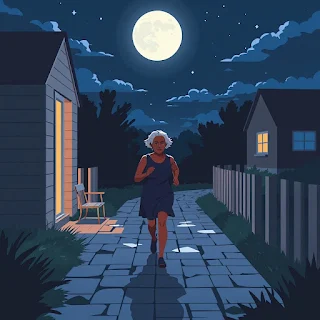Night Running from the Perspective of an Old Woman Afraid of the Dark
Night Running in Africa: Unraveling the Fearful Mystery of Nocturnal Disturbances
Night Running from the Perspective of an Old Woman Afraid of the Dark
I’m an old woman living in Njiru, and the dark has always been my enemy. The night wraps around my little house like a heavy blanket, and every creak or rustle sets my heart racing. But it’s not just the darkness itself that terrifies me—it’s the night runners. These shadowy figures, whether driven by spirits, witchcraft, or something darker, turn my fear of the night into a living nightmare.
When the moon rises, the sounds begin. A sharp bang on my tin roof, a handful of dirt smacking my door, a faint tap-tap-tap on my window. I clutch my blanket, eyes wide, straining to see through the blackness. They say night running is a family curse or a spell cast by someone with malice in their heart. I don’t know what’s true, but I know the dread it brings to those of us who tremble at the thought of the dark.
These runners, men and women, clothed or bare, slip through the shadows of places like Limuru, Ruiru, Ruai, and Thika—sprawling Kenyan towns where the night is thick and heavy. They leap and sprint, as if the darkness itself guides them, targeting folks like me who are too old or too scared to confront them. They say spirits force them to run, to let demons loose, but to me, it feels like they revel in our fear, stirring panic in the hearts of those who already dread the night.
The community whispers about them, saying they’re bewitched, compelled by ancestors or dark magic. But there’s no comfort in those stories when you’re lying awake, heart pounding, imagining every sound is a runner creeping closer. I’ve heard of them being caught, beaten, or worse—neighbors driven to rage by the constant terror. Some even set traps, hoping to catch a runner for bribes or to expose them. Yet the runners keep coming, as if the night itself pulls them out, no matter the danger.
They say it’s like a sickness, something called OCD, where the urge to run grips them so tightly they can’t stop, even when they’re hurt or sick. But for those of us afraid of the dark, it’s not just their problem—it’s ours. Every noise chips away at our peace, making the night feel like a battlefield. I used to think exercise could calm the mind, but this night running? It’s no jog in the morning light. It’s chaos, feeding on the fear of folks like me who see monsters in every shadow.
I long for nights when the dark is just quiet, when I can close my eyes without imagining a runner at my door. For those of us who fear the night, these disturbances aren’t just a mystery—they’re a torment we can’t escape.
Night Running in Kenya
Did you know?
Night running is real but there’s no definitive data pinpointing night runners in Kenya, as the practice is secretive and not formally documented. However, based on cultural accounts and anecdotal reports, night runners are typically adults, ranging from young adults in their 20s to older individuals, sometimes well into their 50s or 60s. The belief that night running can be a family trait or induced by witchcraft suggests it spans generations, with no strict age limit. Both men and women participate, and the practice is often tied to those perceived to be under spiritual or psychological compulsion, regardless of age.


